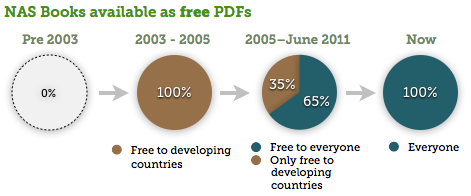Community Embraces New Word Game at Mid-Year Play Day This past Sunday, families at Takoma Park’s Seventh Annual Mid-Year Play Day had the opportunity to experience OtherWordly for the first time. Our educational language game drew curious children and parents to our table throughout the afternoon. Words in Space Several children gathered around our iPads […]
Read moreTag: publishing
What is fan fiction?
June 5th, 2013 by IDEA
 Who owns art and culture? Does it belong to the artist? The legal property owner? Or the society that loves and appreciates it? Traditionally, old art is considered public, and new art is copyrighted. Anyone can write a new twist on Romeo and Juliet, or mashup the Mona Lisa with a mustache. But what if Harry Potter opened a lemonade stand? Or Luke Skywalker had a twin bother? (more…)
Who owns art and culture? Does it belong to the artist? The legal property owner? Or the society that loves and appreciates it? Traditionally, old art is considered public, and new art is copyrighted. Anyone can write a new twist on Romeo and Juliet, or mashup the Mona Lisa with a mustache. But what if Harry Potter opened a lemonade stand? Or Luke Skywalker had a twin bother? (more…)
 Imploded by the same forces that have disrupted the broader publishing industry, the dictionary business struggles to get a grip on the online/mobile world. “Our research tells us that most people today get their reference information via their computer, tablet, or phone” said Stephen Bullon, Macmillan Education’s Publisher for Dictionaries, “and the message is clear and unambiguous: the future of the dictionary is digital.” (more…)
Imploded by the same forces that have disrupted the broader publishing industry, the dictionary business struggles to get a grip on the online/mobile world. “Our research tells us that most people today get their reference information via their computer, tablet, or phone” said Stephen Bullon, Macmillan Education’s Publisher for Dictionaries, “and the message is clear and unambiguous: the future of the dictionary is digital.” (more…)
![]() Science journal subscriptions can cost libraries several thousand dollars a year, yet most institutions members only make use of a few articles from each of these journals. The huge subscription expenses limit how many journals each school or company can carry. Even single article pricing can be staggering, at $30-50 each. Sinisa Hrvatin, a doctoral candidate at Harvard, and his roommate Robert McGrath believe they have a better way. (more…)
Science journal subscriptions can cost libraries several thousand dollars a year, yet most institutions members only make use of a few articles from each of these journals. The huge subscription expenses limit how many journals each school or company can carry. Even single article pricing can be staggering, at $30-50 each. Sinisa Hrvatin, a doctoral candidate at Harvard, and his roommate Robert McGrath believe they have a better way. (more…)
 Open textbooks are receiving a potential boost by an ambitious new, organized peer review project organized by the University of Minnesota. The average college student suffers with $1,000 or more in annual textbook costs; however, if more professors adopt open textbooks, higher education will become more affordable. (more…)
Open textbooks are receiving a potential boost by an ambitious new, organized peer review project organized by the University of Minnesota. The average college student suffers with $1,000 or more in annual textbook costs; however, if more professors adopt open textbooks, higher education will become more affordable. (more…)
![]() All publications from the National Academies Press (NAP) are now available for free as PDFs. NAP is the publishing arm of the National Academies, and publishes 200+ books a year on topics in science, engineering, and health.
All publications from the National Academies Press (NAP) are now available for free as PDFs. NAP is the publishing arm of the National Academies, and publishes 200+ books a year on topics in science, engineering, and health.
Making the PDFs free is the culmination of a decade of research and sales modeling on how to finance a nimble publishing house with paid print books, with enough spare revenue to allow free release of electronic books. Here’s the evolution:
 Open access means that readers have free access. But who pays for the operational costs of running a publication? Often it’s the authors, though there are several common business models.
Open access means that readers have free access. But who pays for the operational costs of running a publication? Often it’s the authors, though there are several common business models.
How much are authors paying? What do they think about it? And what are some other business models to sustain journals and other kinds of digital content? (more…)
Finding a sensible and sustainable way to provide web site visitors with fresh information is crucial. A mobile Guernsey, such as Minnie, is not a sensible way to distribute fresh milk. To be effective, educational projects need to find a sensible and sustainable method of disseminating fresh information to users. Educational projects have a wealth



 Museums and archives manage information about their collections, facilitate interdepartmental communication, and make collections available to the public using collection management software. Here’s a rundown of the collection management systems being
Museums and archives manage information about their collections, facilitate interdepartmental communication, and make collections available to the public using collection management software. Here’s a rundown of the collection management systems being